Organizational Behaviour: Influence of Culture, Power, and Motivation
VerifiedAdded on 2023/01/11
|16
|5065
|96
AI Summary
This document explores the influence of organizational culture, power dynamics, and motivational theories on individual and team behavior. It discusses the role of culture in shaping behavior, the different types of power in organizations, and the impact of motivation on achieving goals. The document also critiques the effectiveness of motivational theories and their relevance in organizational behavior.
Contribute Materials
Your contribution can guide someone’s learning journey. Share your
documents today.
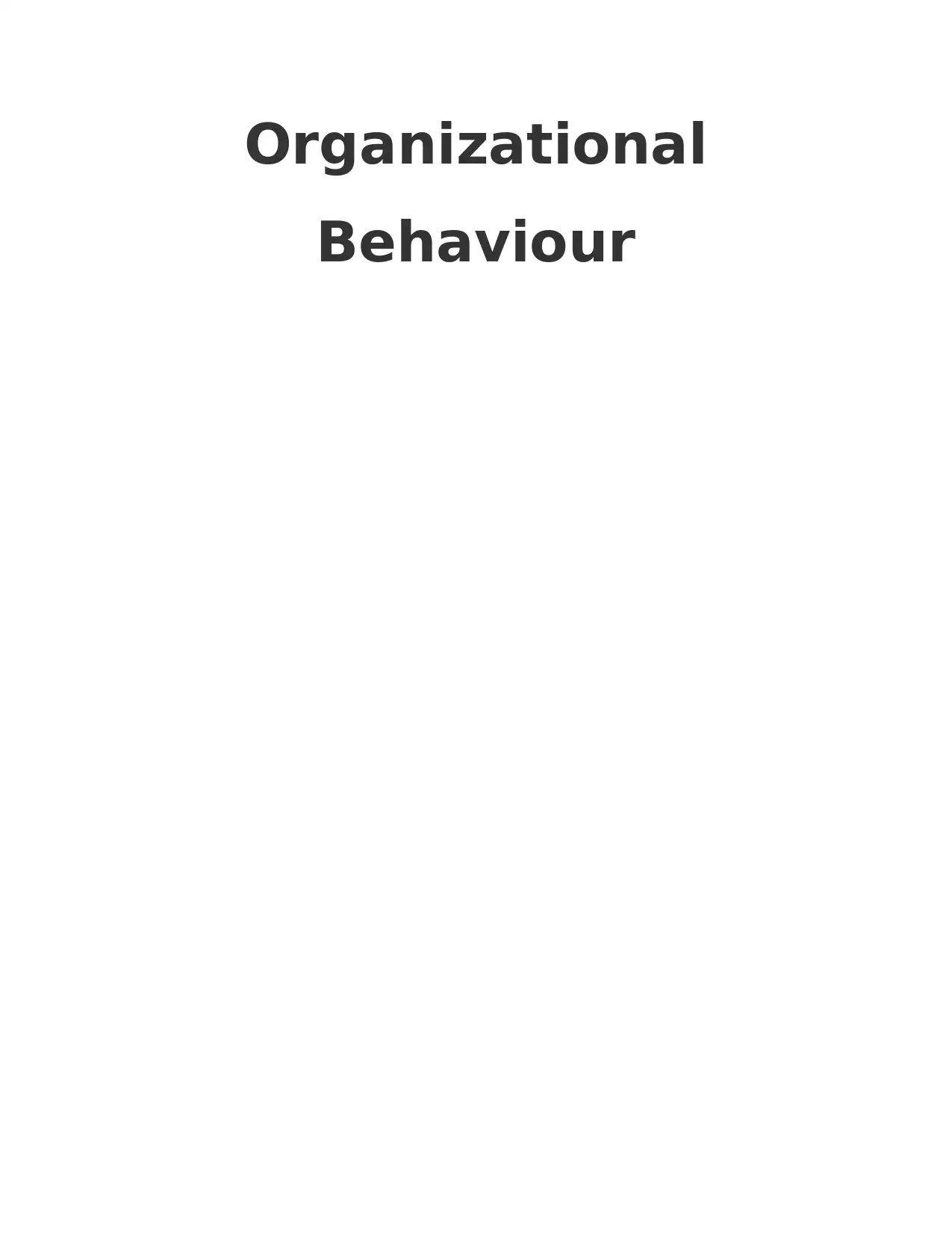
Organizational
Behaviour
Behaviour
Secure Best Marks with AI Grader
Need help grading? Try our AI Grader for instant feedback on your assignments.
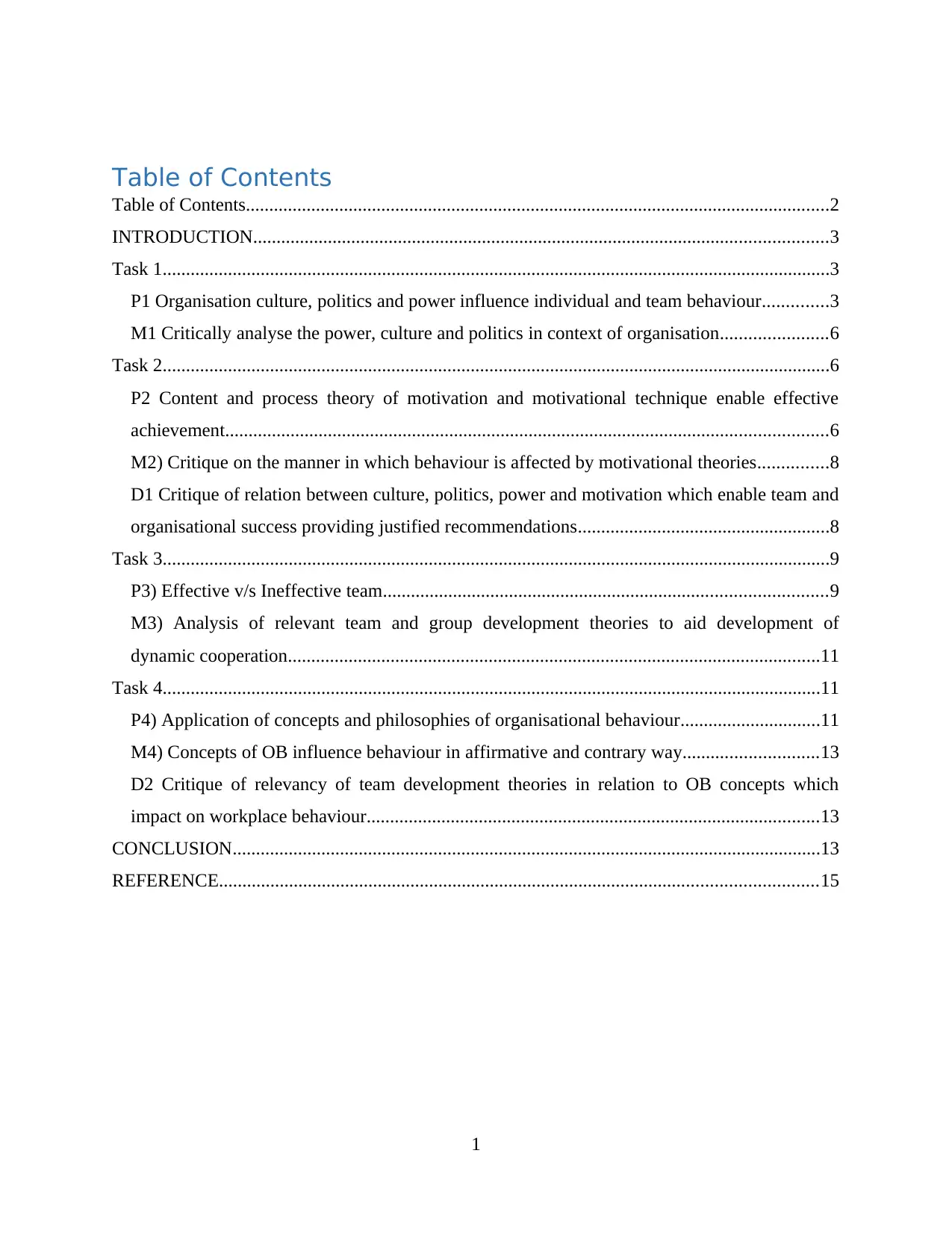
Table of Contents
Table of Contents.............................................................................................................................2
INTRODUCTION...........................................................................................................................3
Task 1...............................................................................................................................................3
P1 Organisation culture, politics and power influence individual and team behaviour..............3
M1 Critically analyse the power, culture and politics in context of organisation.......................6
Task 2...............................................................................................................................................6
P2 Content and process theory of motivation and motivational technique enable effective
achievement.................................................................................................................................6
M2) Critique on the manner in which behaviour is affected by motivational theories...............8
D1 Critique of relation between culture, politics, power and motivation which enable team and
organisational success providing justified recommendations......................................................8
Task 3...............................................................................................................................................9
P3) Effective v/s Ineffective team...............................................................................................9
M3) Analysis of relevant team and group development theories to aid development of
dynamic cooperation..................................................................................................................11
Task 4.............................................................................................................................................11
P4) Application of concepts and philosophies of organisational behaviour..............................11
M4) Concepts of OB influence behaviour in affirmative and contrary way.............................13
D2 Critique of relevancy of team development theories in relation to OB concepts which
impact on workplace behaviour.................................................................................................13
CONCLUSION..............................................................................................................................13
REFERENCE................................................................................................................................15
1
Table of Contents.............................................................................................................................2
INTRODUCTION...........................................................................................................................3
Task 1...............................................................................................................................................3
P1 Organisation culture, politics and power influence individual and team behaviour..............3
M1 Critically analyse the power, culture and politics in context of organisation.......................6
Task 2...............................................................................................................................................6
P2 Content and process theory of motivation and motivational technique enable effective
achievement.................................................................................................................................6
M2) Critique on the manner in which behaviour is affected by motivational theories...............8
D1 Critique of relation between culture, politics, power and motivation which enable team and
organisational success providing justified recommendations......................................................8
Task 3...............................................................................................................................................9
P3) Effective v/s Ineffective team...............................................................................................9
M3) Analysis of relevant team and group development theories to aid development of
dynamic cooperation..................................................................................................................11
Task 4.............................................................................................................................................11
P4) Application of concepts and philosophies of organisational behaviour..............................11
M4) Concepts of OB influence behaviour in affirmative and contrary way.............................13
D2 Critique of relevancy of team development theories in relation to OB concepts which
impact on workplace behaviour.................................................................................................13
CONCLUSION..............................................................................................................................13
REFERENCE................................................................................................................................15
1
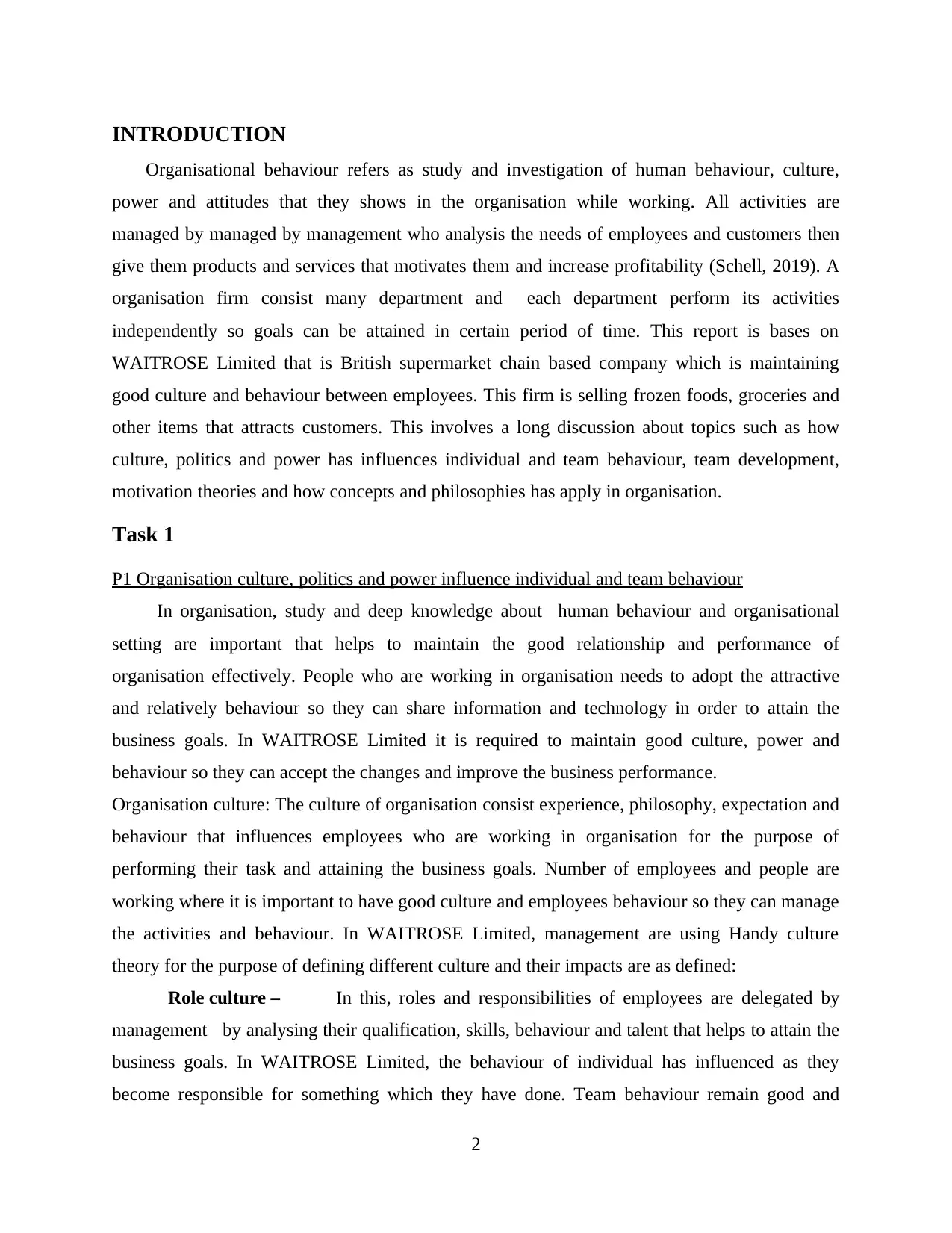
INTRODUCTION
Organisational behaviour refers as study and investigation of human behaviour, culture,
power and attitudes that they shows in the organisation while working. All activities are
managed by managed by management who analysis the needs of employees and customers then
give them products and services that motivates them and increase profitability (Schell, 2019). A
organisation firm consist many department and each department perform its activities
independently so goals can be attained in certain period of time. This report is bases on
WAITROSE Limited that is British supermarket chain based company which is maintaining
good culture and behaviour between employees. This firm is selling frozen foods, groceries and
other items that attracts customers. This involves a long discussion about topics such as how
culture, politics and power has influences individual and team behaviour, team development,
motivation theories and how concepts and philosophies has apply in organisation.
Task 1
P1 Organisation culture, politics and power influence individual and team behaviour
In organisation, study and deep knowledge about human behaviour and organisational
setting are important that helps to maintain the good relationship and performance of
organisation effectively. People who are working in organisation needs to adopt the attractive
and relatively behaviour so they can share information and technology in order to attain the
business goals. In WAITROSE Limited it is required to maintain good culture, power and
behaviour so they can accept the changes and improve the business performance.
Organisation culture: The culture of organisation consist experience, philosophy, expectation and
behaviour that influences employees who are working in organisation for the purpose of
performing their task and attaining the business goals. Number of employees and people are
working where it is important to have good culture and employees behaviour so they can manage
the activities and behaviour. In WAITROSE Limited, management are using Handy culture
theory for the purpose of defining different culture and their impacts are as defined:
Role culture – In this, roles and responsibilities of employees are delegated by
management by analysing their qualification, skills, behaviour and talent that helps to attain the
business goals. In WAITROSE Limited, the behaviour of individual has influenced as they
become responsible for something which they have done. Team behaviour remain good and
2
Organisational behaviour refers as study and investigation of human behaviour, culture,
power and attitudes that they shows in the organisation while working. All activities are
managed by managed by management who analysis the needs of employees and customers then
give them products and services that motivates them and increase profitability (Schell, 2019). A
organisation firm consist many department and each department perform its activities
independently so goals can be attained in certain period of time. This report is bases on
WAITROSE Limited that is British supermarket chain based company which is maintaining
good culture and behaviour between employees. This firm is selling frozen foods, groceries and
other items that attracts customers. This involves a long discussion about topics such as how
culture, politics and power has influences individual and team behaviour, team development,
motivation theories and how concepts and philosophies has apply in organisation.
Task 1
P1 Organisation culture, politics and power influence individual and team behaviour
In organisation, study and deep knowledge about human behaviour and organisational
setting are important that helps to maintain the good relationship and performance of
organisation effectively. People who are working in organisation needs to adopt the attractive
and relatively behaviour so they can share information and technology in order to attain the
business goals. In WAITROSE Limited it is required to maintain good culture, power and
behaviour so they can accept the changes and improve the business performance.
Organisation culture: The culture of organisation consist experience, philosophy, expectation and
behaviour that influences employees who are working in organisation for the purpose of
performing their task and attaining the business goals. Number of employees and people are
working where it is important to have good culture and employees behaviour so they can manage
the activities and behaviour. In WAITROSE Limited, management are using Handy culture
theory for the purpose of defining different culture and their impacts are as defined:
Role culture – In this, roles and responsibilities of employees are delegated by
management by analysing their qualification, skills, behaviour and talent that helps to attain the
business goals. In WAITROSE Limited, the behaviour of individual has influenced as they
become responsible for something which they have done. Team behaviour remain good and
2
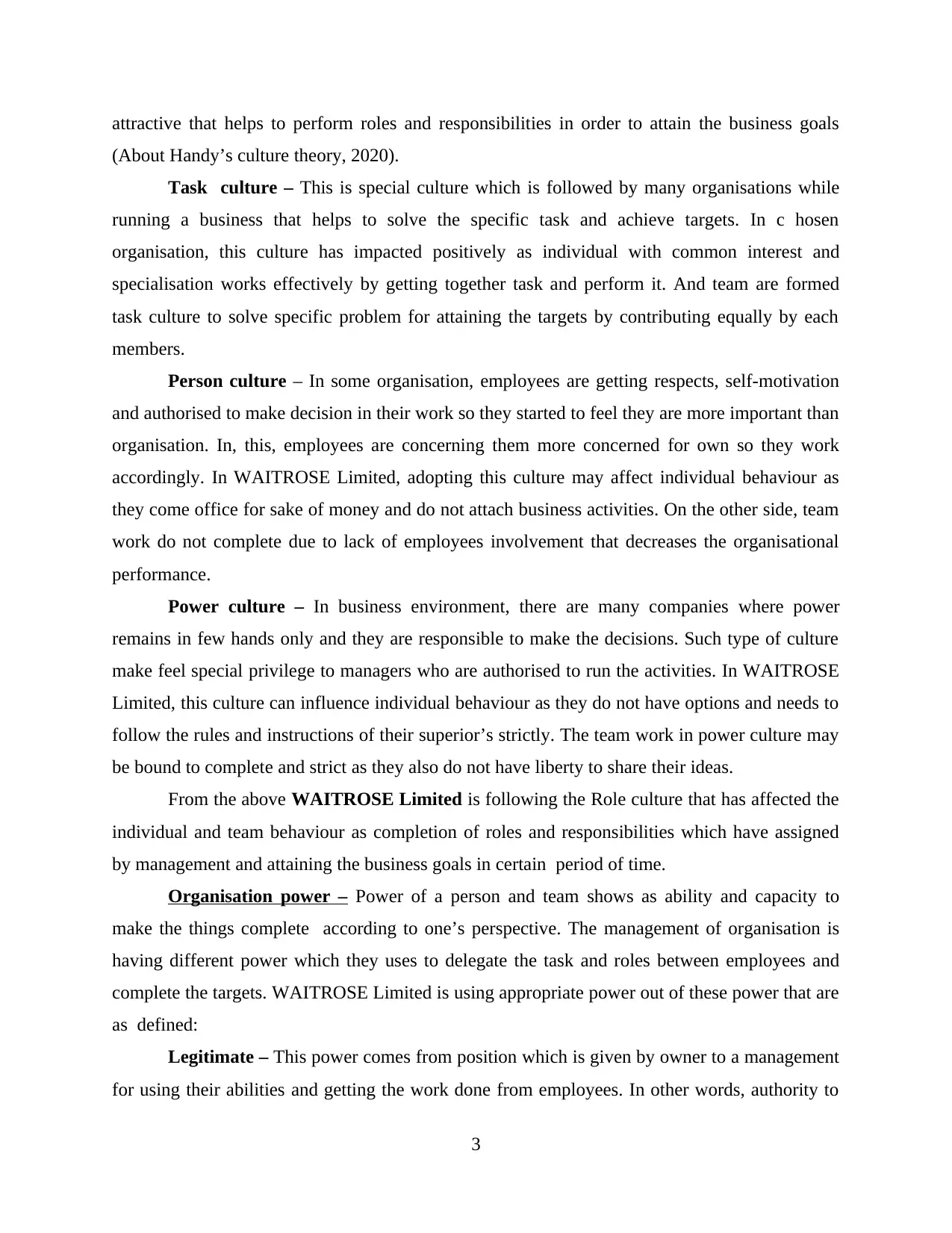
attractive that helps to perform roles and responsibilities in order to attain the business goals
(About Handy’s culture theory, 2020).
Task culture – This is special culture which is followed by many organisations while
running a business that helps to solve the specific task and achieve targets. In c hosen
organisation, this culture has impacted positively as individual with common interest and
specialisation works effectively by getting together task and perform it. And team are formed
task culture to solve specific problem for attaining the targets by contributing equally by each
members.
Person culture – In some organisation, employees are getting respects, self-motivation
and authorised to make decision in their work so they started to feel they are more important than
organisation. In, this, employees are concerning them more concerned for own so they work
accordingly. In WAITROSE Limited, adopting this culture may affect individual behaviour as
they come office for sake of money and do not attach business activities. On the other side, team
work do not complete due to lack of employees involvement that decreases the organisational
performance.
Power culture – In business environment, there are many companies where power
remains in few hands only and they are responsible to make the decisions. Such type of culture
make feel special privilege to managers who are authorised to run the activities. In WAITROSE
Limited, this culture can influence individual behaviour as they do not have options and needs to
follow the rules and instructions of their superior’s strictly. The team work in power culture may
be bound to complete and strict as they also do not have liberty to share their ideas.
From the above WAITROSE Limited is following the Role culture that has affected the
individual and team behaviour as completion of roles and responsibilities which have assigned
by management and attaining the business goals in certain period of time.
Organisation power – Power of a person and team shows as ability and capacity to
make the things complete according to one’s perspective. The management of organisation is
having different power which they uses to delegate the task and roles between employees and
complete the targets. WAITROSE Limited is using appropriate power out of these power that are
as defined:
Legitimate – This power comes from position which is given by owner to a management
for using their abilities and getting the work done from employees. In other words, authority to
3
(About Handy’s culture theory, 2020).
Task culture – This is special culture which is followed by many organisations while
running a business that helps to solve the specific task and achieve targets. In c hosen
organisation, this culture has impacted positively as individual with common interest and
specialisation works effectively by getting together task and perform it. And team are formed
task culture to solve specific problem for attaining the targets by contributing equally by each
members.
Person culture – In some organisation, employees are getting respects, self-motivation
and authorised to make decision in their work so they started to feel they are more important than
organisation. In, this, employees are concerning them more concerned for own so they work
accordingly. In WAITROSE Limited, adopting this culture may affect individual behaviour as
they come office for sake of money and do not attach business activities. On the other side, team
work do not complete due to lack of employees involvement that decreases the organisational
performance.
Power culture – In business environment, there are many companies where power
remains in few hands only and they are responsible to make the decisions. Such type of culture
make feel special privilege to managers who are authorised to run the activities. In WAITROSE
Limited, this culture can influence individual behaviour as they do not have options and needs to
follow the rules and instructions of their superior’s strictly. The team work in power culture may
be bound to complete and strict as they also do not have liberty to share their ideas.
From the above WAITROSE Limited is following the Role culture that has affected the
individual and team behaviour as completion of roles and responsibilities which have assigned
by management and attaining the business goals in certain period of time.
Organisation power – Power of a person and team shows as ability and capacity to
make the things complete according to one’s perspective. The management of organisation is
having different power which they uses to delegate the task and roles between employees and
complete the targets. WAITROSE Limited is using appropriate power out of these power that are
as defined:
Legitimate – This power comes from position which is given by owner to a management
for using their abilities and getting the work done from employees. In other words, authority to
3
Secure Best Marks with AI Grader
Need help grading? Try our AI Grader for instant feedback on your assignments.
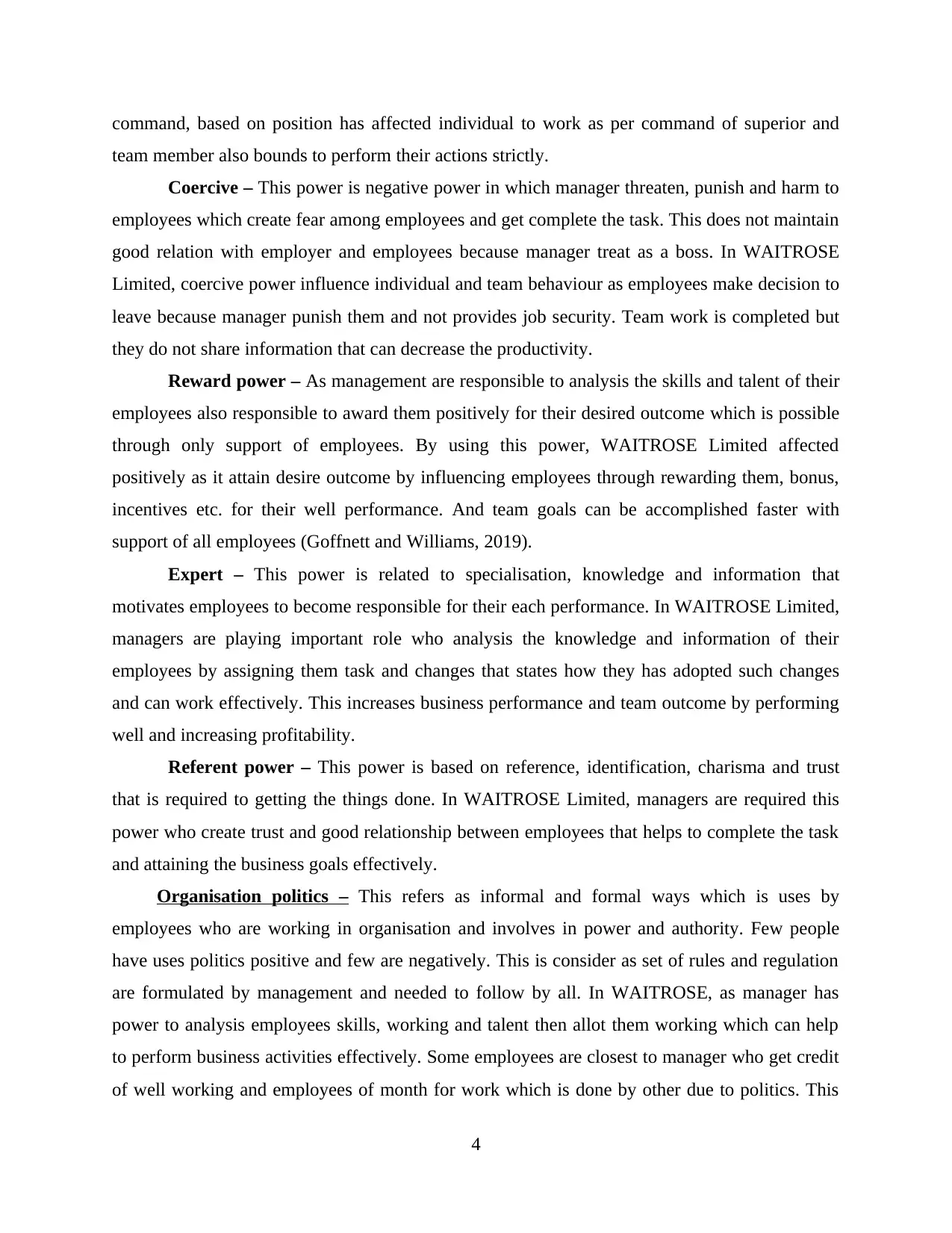
command, based on position has affected individual to work as per command of superior and
team member also bounds to perform their actions strictly.
Coercive – This power is negative power in which manager threaten, punish and harm to
employees which create fear among employees and get complete the task. This does not maintain
good relation with employer and employees because manager treat as a boss. In WAITROSE
Limited, coercive power influence individual and team behaviour as employees make decision to
leave because manager punish them and not provides job security. Team work is completed but
they do not share information that can decrease the productivity.
Reward power – As management are responsible to analysis the skills and talent of their
employees also responsible to award them positively for their desired outcome which is possible
through only support of employees. By using this power, WAITROSE Limited affected
positively as it attain desire outcome by influencing employees through rewarding them, bonus,
incentives etc. for their well performance. And team goals can be accomplished faster with
support of all employees (Goffnett and Williams, 2019).
Expert – This power is related to specialisation, knowledge and information that
motivates employees to become responsible for their each performance. In WAITROSE Limited,
managers are playing important role who analysis the knowledge and information of their
employees by assigning them task and changes that states how they has adopted such changes
and can work effectively. This increases business performance and team outcome by performing
well and increasing profitability.
Referent power – This power is based on reference, identification, charisma and trust
that is required to getting the things done. In WAITROSE Limited, managers are required this
power who create trust and good relationship between employees that helps to complete the task
and attaining the business goals effectively.
Organisation politics – This refers as informal and formal ways which is uses by
employees who are working in organisation and involves in power and authority. Few people
have uses politics positive and few are negatively. This is consider as set of rules and regulation
are formulated by management and needed to follow by all. In WAITROSE, as manager has
power to analysis employees skills, working and talent then allot them working which can help
to perform business activities effectively. Some employees are closest to manager who get credit
of well working and employees of month for work which is done by other due to politics. This
4
team member also bounds to perform their actions strictly.
Coercive – This power is negative power in which manager threaten, punish and harm to
employees which create fear among employees and get complete the task. This does not maintain
good relation with employer and employees because manager treat as a boss. In WAITROSE
Limited, coercive power influence individual and team behaviour as employees make decision to
leave because manager punish them and not provides job security. Team work is completed but
they do not share information that can decrease the productivity.
Reward power – As management are responsible to analysis the skills and talent of their
employees also responsible to award them positively for their desired outcome which is possible
through only support of employees. By using this power, WAITROSE Limited affected
positively as it attain desire outcome by influencing employees through rewarding them, bonus,
incentives etc. for their well performance. And team goals can be accomplished faster with
support of all employees (Goffnett and Williams, 2019).
Expert – This power is related to specialisation, knowledge and information that
motivates employees to become responsible for their each performance. In WAITROSE Limited,
managers are playing important role who analysis the knowledge and information of their
employees by assigning them task and changes that states how they has adopted such changes
and can work effectively. This increases business performance and team outcome by performing
well and increasing profitability.
Referent power – This power is based on reference, identification, charisma and trust
that is required to getting the things done. In WAITROSE Limited, managers are required this
power who create trust and good relationship between employees that helps to complete the task
and attaining the business goals effectively.
Organisation politics – This refers as informal and formal ways which is uses by
employees who are working in organisation and involves in power and authority. Few people
have uses politics positive and few are negatively. This is consider as set of rules and regulation
are formulated by management and needed to follow by all. In WAITROSE, as manager has
power to analysis employees skills, working and talent then allot them working which can help
to perform business activities effectively. Some employees are closest to manager who get credit
of well working and employees of month for work which is done by other due to politics. This
4
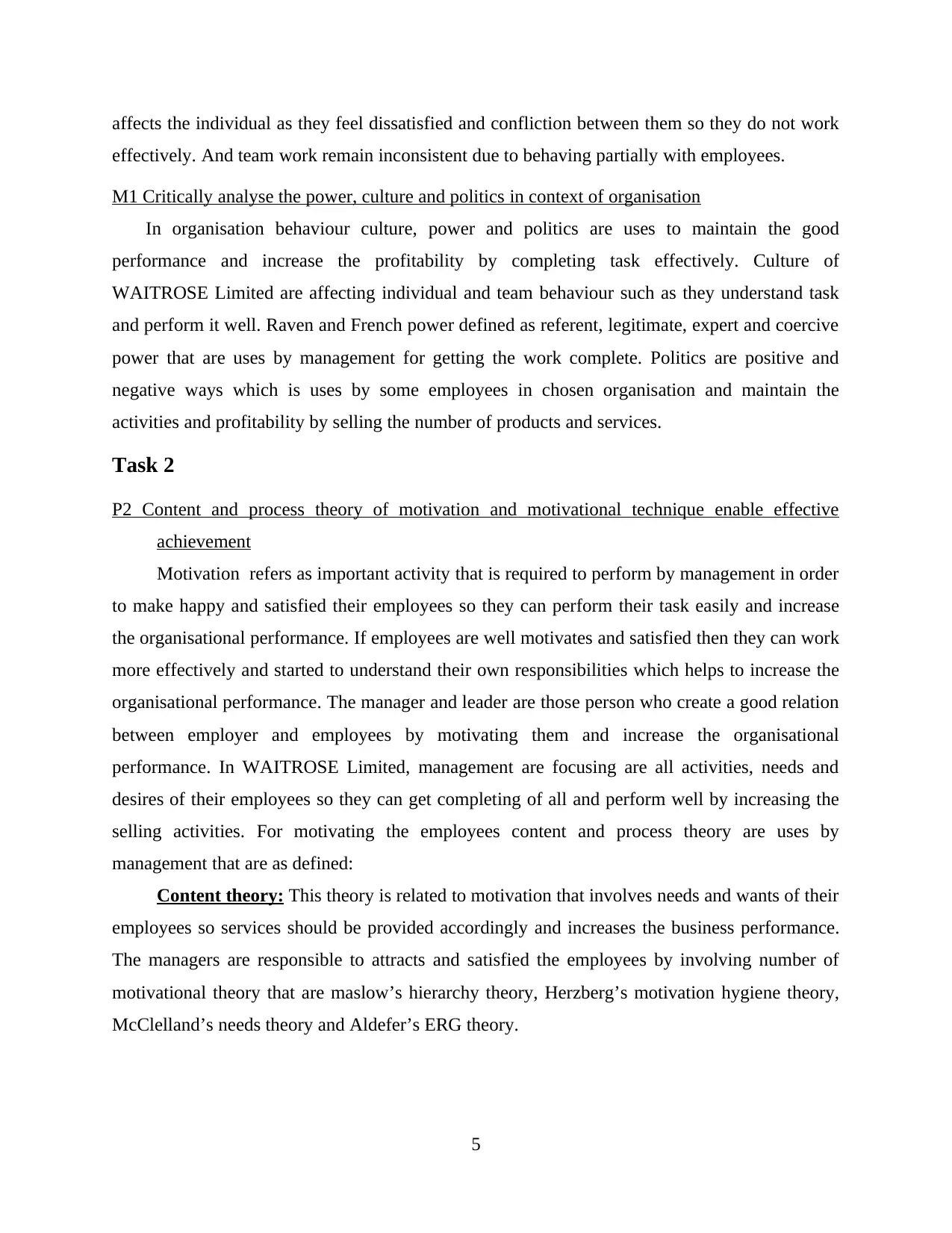
affects the individual as they feel dissatisfied and confliction between them so they do not work
effectively. And team work remain inconsistent due to behaving partially with employees.
M1 Critically analyse the power, culture and politics in context of organisation
In organisation behaviour culture, power and politics are uses to maintain the good
performance and increase the profitability by completing task effectively. Culture of
WAITROSE Limited are affecting individual and team behaviour such as they understand task
and perform it well. Raven and French power defined as referent, legitimate, expert and coercive
power that are uses by management for getting the work complete. Politics are positive and
negative ways which is uses by some employees in chosen organisation and maintain the
activities and profitability by selling the number of products and services.
Task 2
P2 Content and process theory of motivation and motivational technique enable effective
achievement
Motivation refers as important activity that is required to perform by management in order
to make happy and satisfied their employees so they can perform their task easily and increase
the organisational performance. If employees are well motivates and satisfied then they can work
more effectively and started to understand their own responsibilities which helps to increase the
organisational performance. The manager and leader are those person who create a good relation
between employer and employees by motivating them and increase the organisational
performance. In WAITROSE Limited, management are focusing are all activities, needs and
desires of their employees so they can get completing of all and perform well by increasing the
selling activities. For motivating the employees content and process theory are uses by
management that are as defined:
Content theory: This theory is related to motivation that involves needs and wants of their
employees so services should be provided accordingly and increases the business performance.
The managers are responsible to attracts and satisfied the employees by involving number of
motivational theory that are maslow’s hierarchy theory, Herzberg’s motivation hygiene theory,
McClelland’s needs theory and Aldefer’s ERG theory.
5
effectively. And team work remain inconsistent due to behaving partially with employees.
M1 Critically analyse the power, culture and politics in context of organisation
In organisation behaviour culture, power and politics are uses to maintain the good
performance and increase the profitability by completing task effectively. Culture of
WAITROSE Limited are affecting individual and team behaviour such as they understand task
and perform it well. Raven and French power defined as referent, legitimate, expert and coercive
power that are uses by management for getting the work complete. Politics are positive and
negative ways which is uses by some employees in chosen organisation and maintain the
activities and profitability by selling the number of products and services.
Task 2
P2 Content and process theory of motivation and motivational technique enable effective
achievement
Motivation refers as important activity that is required to perform by management in order
to make happy and satisfied their employees so they can perform their task easily and increase
the organisational performance. If employees are well motivates and satisfied then they can work
more effectively and started to understand their own responsibilities which helps to increase the
organisational performance. The manager and leader are those person who create a good relation
between employer and employees by motivating them and increase the organisational
performance. In WAITROSE Limited, management are focusing are all activities, needs and
desires of their employees so they can get completing of all and perform well by increasing the
selling activities. For motivating the employees content and process theory are uses by
management that are as defined:
Content theory: This theory is related to motivation that involves needs and wants of their
employees so services should be provided accordingly and increases the business performance.
The managers are responsible to attracts and satisfied the employees by involving number of
motivational theory that are maslow’s hierarchy theory, Herzberg’s motivation hygiene theory,
McClelland’s needs theory and Aldefer’s ERG theory.
5
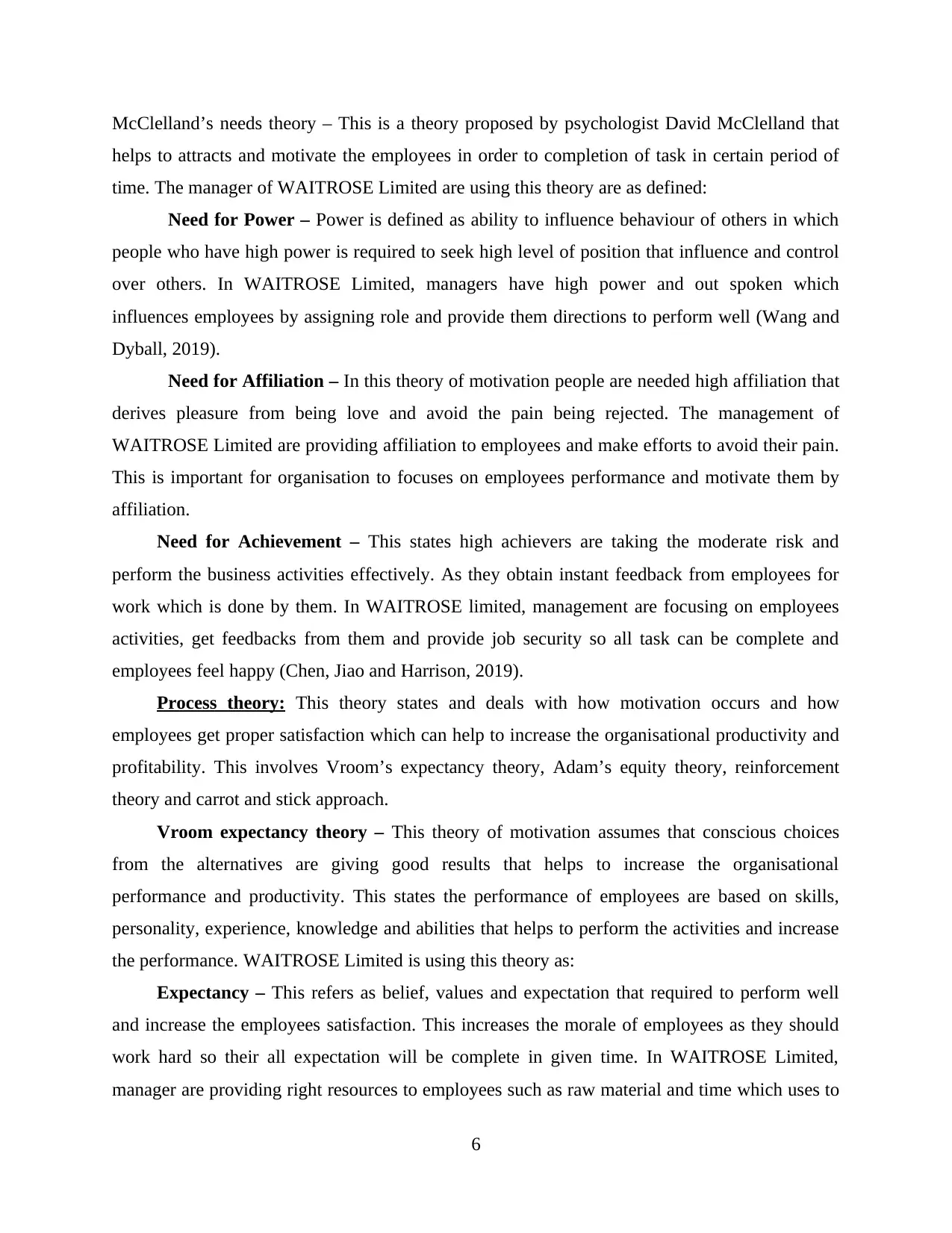
McClelland’s needs theory – This is a theory proposed by psychologist David McClelland that
helps to attracts and motivate the employees in order to completion of task in certain period of
time. The manager of WAITROSE Limited are using this theory are as defined:
Need for Power – Power is defined as ability to influence behaviour of others in which
people who have high power is required to seek high level of position that influence and control
over others. In WAITROSE Limited, managers have high power and out spoken which
influences employees by assigning role and provide them directions to perform well (Wang and
Dyball, 2019).
Need for Affiliation – In this theory of motivation people are needed high affiliation that
derives pleasure from being love and avoid the pain being rejected. The management of
WAITROSE Limited are providing affiliation to employees and make efforts to avoid their pain.
This is important for organisation to focuses on employees performance and motivate them by
affiliation.
Need for Achievement – This states high achievers are taking the moderate risk and
perform the business activities effectively. As they obtain instant feedback from employees for
work which is done by them. In WAITROSE limited, management are focusing on employees
activities, get feedbacks from them and provide job security so all task can be complete and
employees feel happy (Chen, Jiao and Harrison, 2019).
Process theory: This theory states and deals with how motivation occurs and how
employees get proper satisfaction which can help to increase the organisational productivity and
profitability. This involves Vroom’s expectancy theory, Adam’s equity theory, reinforcement
theory and carrot and stick approach.
Vroom expectancy theory – This theory of motivation assumes that conscious choices
from the alternatives are giving good results that helps to increase the organisational
performance and productivity. This states the performance of employees are based on skills,
personality, experience, knowledge and abilities that helps to perform the activities and increase
the performance. WAITROSE Limited is using this theory as:
Expectancy – This refers as belief, values and expectation that required to perform well
and increase the employees satisfaction. This increases the morale of employees as they should
work hard so their all expectation will be complete in given time. In WAITROSE Limited,
manager are providing right resources to employees such as raw material and time which uses to
6
helps to attracts and motivate the employees in order to completion of task in certain period of
time. The manager of WAITROSE Limited are using this theory are as defined:
Need for Power – Power is defined as ability to influence behaviour of others in which
people who have high power is required to seek high level of position that influence and control
over others. In WAITROSE Limited, managers have high power and out spoken which
influences employees by assigning role and provide them directions to perform well (Wang and
Dyball, 2019).
Need for Affiliation – In this theory of motivation people are needed high affiliation that
derives pleasure from being love and avoid the pain being rejected. The management of
WAITROSE Limited are providing affiliation to employees and make efforts to avoid their pain.
This is important for organisation to focuses on employees performance and motivate them by
affiliation.
Need for Achievement – This states high achievers are taking the moderate risk and
perform the business activities effectively. As they obtain instant feedback from employees for
work which is done by them. In WAITROSE limited, management are focusing on employees
activities, get feedbacks from them and provide job security so all task can be complete and
employees feel happy (Chen, Jiao and Harrison, 2019).
Process theory: This theory states and deals with how motivation occurs and how
employees get proper satisfaction which can help to increase the organisational productivity and
profitability. This involves Vroom’s expectancy theory, Adam’s equity theory, reinforcement
theory and carrot and stick approach.
Vroom expectancy theory – This theory of motivation assumes that conscious choices
from the alternatives are giving good results that helps to increase the organisational
performance and productivity. This states the performance of employees are based on skills,
personality, experience, knowledge and abilities that helps to perform the activities and increase
the performance. WAITROSE Limited is using this theory as:
Expectancy – This refers as belief, values and expectation that required to perform well
and increase the employees satisfaction. This increases the morale of employees as they should
work hard so their all expectation will be complete in given time. In WAITROSE Limited,
manager are providing right resources to employees such as raw material and time which uses to
6
Paraphrase This Document
Need a fresh take? Get an instant paraphrase of this document with our AI Paraphraser
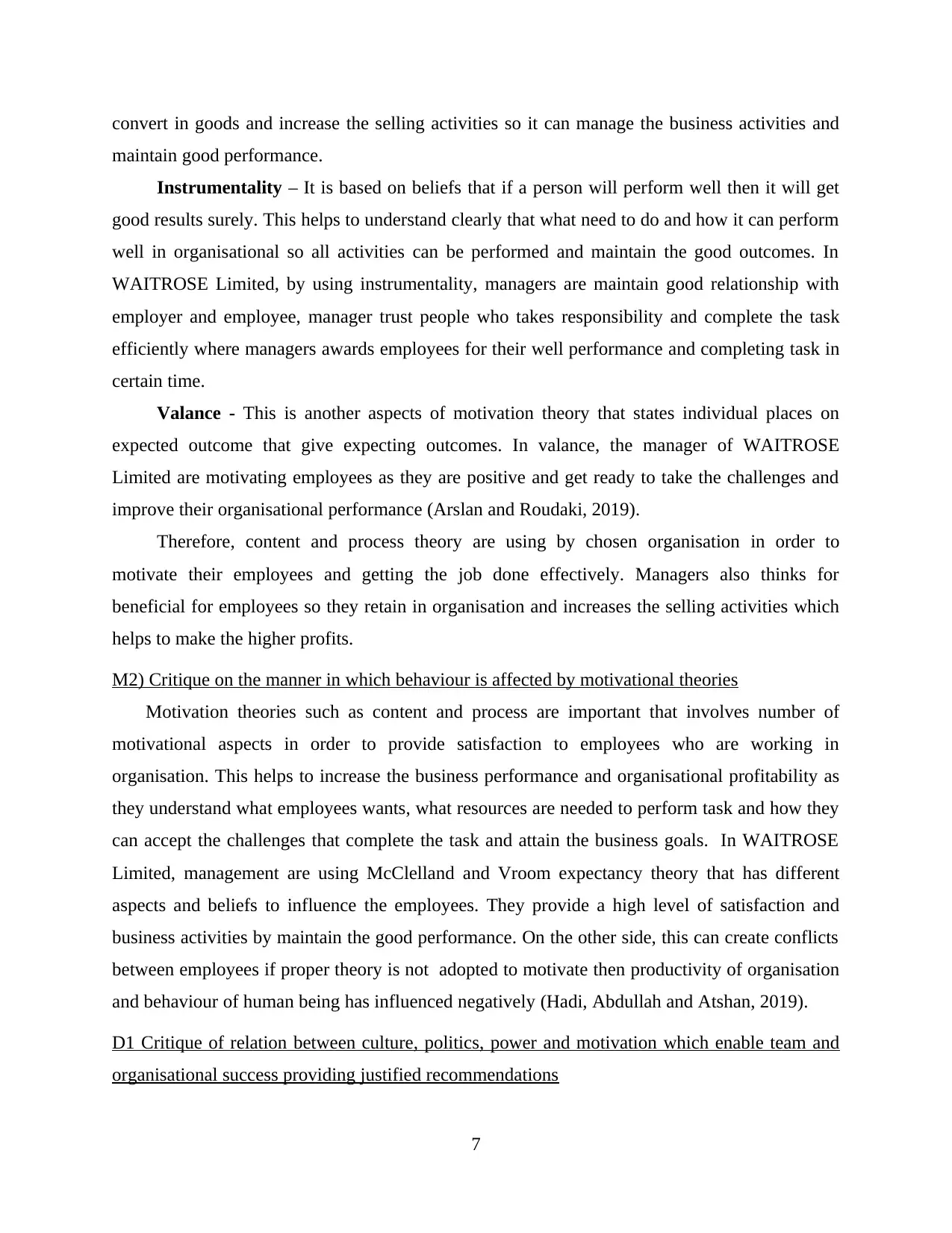
convert in goods and increase the selling activities so it can manage the business activities and
maintain good performance.
Instrumentality – It is based on beliefs that if a person will perform well then it will get
good results surely. This helps to understand clearly that what need to do and how it can perform
well in organisational so all activities can be performed and maintain the good outcomes. In
WAITROSE Limited, by using instrumentality, managers are maintain good relationship with
employer and employee, manager trust people who takes responsibility and complete the task
efficiently where managers awards employees for their well performance and completing task in
certain time.
Valance - This is another aspects of motivation theory that states individual places on
expected outcome that give expecting outcomes. In valance, the manager of WAITROSE
Limited are motivating employees as they are positive and get ready to take the challenges and
improve their organisational performance (Arslan and Roudaki, 2019).
Therefore, content and process theory are using by chosen organisation in order to
motivate their employees and getting the job done effectively. Managers also thinks for
beneficial for employees so they retain in organisation and increases the selling activities which
helps to make the higher profits.
M2) Critique on the manner in which behaviour is affected by motivational theories
Motivation theories such as content and process are important that involves number of
motivational aspects in order to provide satisfaction to employees who are working in
organisation. This helps to increase the business performance and organisational profitability as
they understand what employees wants, what resources are needed to perform task and how they
can accept the challenges that complete the task and attain the business goals. In WAITROSE
Limited, management are using McClelland and Vroom expectancy theory that has different
aspects and beliefs to influence the employees. They provide a high level of satisfaction and
business activities by maintain the good performance. On the other side, this can create conflicts
between employees if proper theory is not adopted to motivate then productivity of organisation
and behaviour of human being has influenced negatively (Hadi, Abdullah and Atshan, 2019).
D1 Critique of relation between culture, politics, power and motivation which enable team and
organisational success providing justified recommendations
7
maintain good performance.
Instrumentality – It is based on beliefs that if a person will perform well then it will get
good results surely. This helps to understand clearly that what need to do and how it can perform
well in organisational so all activities can be performed and maintain the good outcomes. In
WAITROSE Limited, by using instrumentality, managers are maintain good relationship with
employer and employee, manager trust people who takes responsibility and complete the task
efficiently where managers awards employees for their well performance and completing task in
certain time.
Valance - This is another aspects of motivation theory that states individual places on
expected outcome that give expecting outcomes. In valance, the manager of WAITROSE
Limited are motivating employees as they are positive and get ready to take the challenges and
improve their organisational performance (Arslan and Roudaki, 2019).
Therefore, content and process theory are using by chosen organisation in order to
motivate their employees and getting the job done effectively. Managers also thinks for
beneficial for employees so they retain in organisation and increases the selling activities which
helps to make the higher profits.
M2) Critique on the manner in which behaviour is affected by motivational theories
Motivation theories such as content and process are important that involves number of
motivational aspects in order to provide satisfaction to employees who are working in
organisation. This helps to increase the business performance and organisational profitability as
they understand what employees wants, what resources are needed to perform task and how they
can accept the challenges that complete the task and attain the business goals. In WAITROSE
Limited, management are using McClelland and Vroom expectancy theory that has different
aspects and beliefs to influence the employees. They provide a high level of satisfaction and
business activities by maintain the good performance. On the other side, this can create conflicts
between employees if proper theory is not adopted to motivate then productivity of organisation
and behaviour of human being has influenced negatively (Hadi, Abdullah and Atshan, 2019).
D1 Critique of relation between culture, politics, power and motivation which enable team and
organisational success providing justified recommendations
7
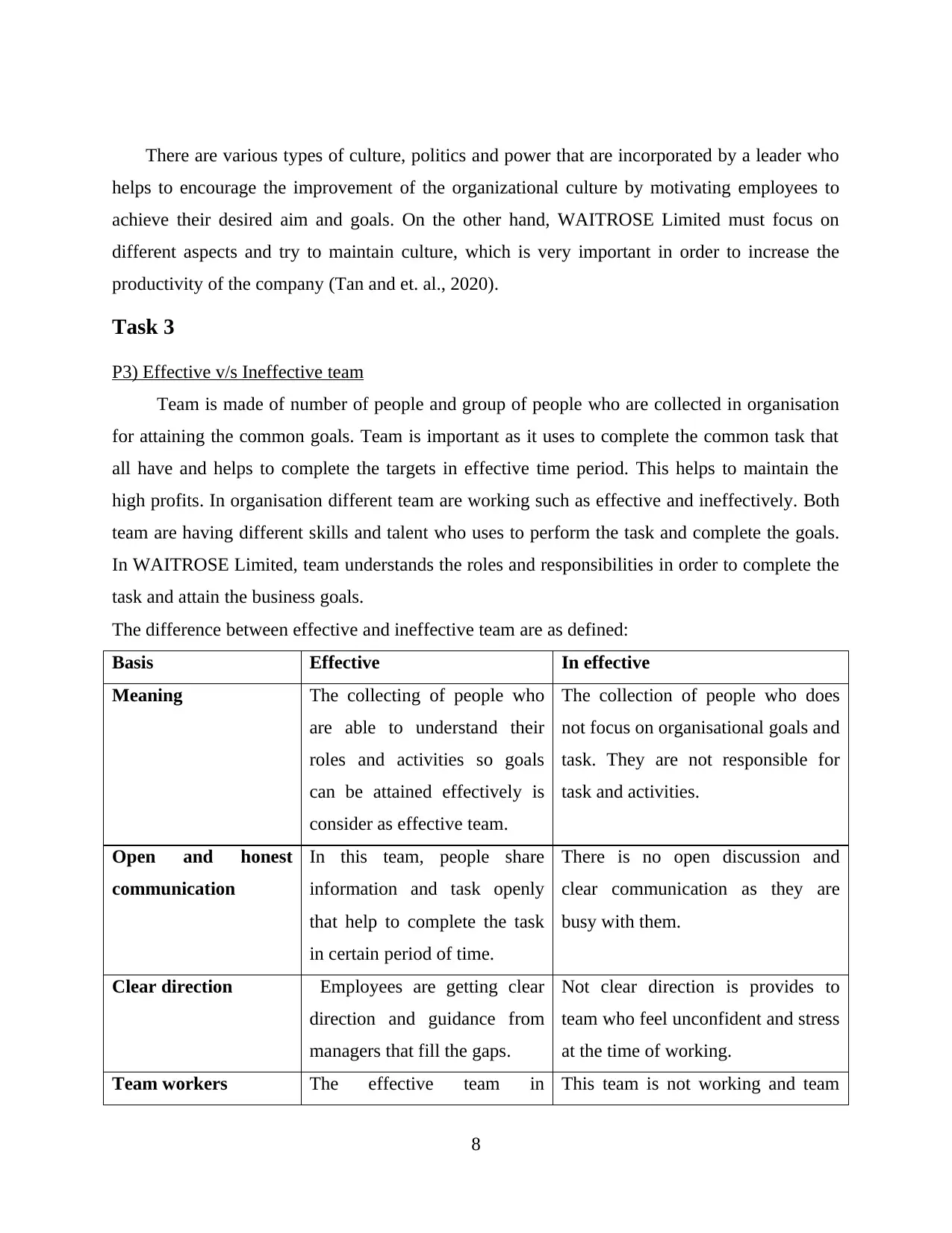
There are various types of culture, politics and power that are incorporated by a leader who
helps to encourage the improvement of the organizational culture by motivating employees to
achieve their desired aim and goals. On the other hand, WAITROSE Limited must focus on
different aspects and try to maintain culture, which is very important in order to increase the
productivity of the company (Tan and et. al., 2020).
Task 3
P3) Effective v/s Ineffective team
Team is made of number of people and group of people who are collected in organisation
for attaining the common goals. Team is important as it uses to complete the common task that
all have and helps to complete the targets in effective time period. This helps to maintain the
high profits. In organisation different team are working such as effective and ineffectively. Both
team are having different skills and talent who uses to perform the task and complete the goals.
In WAITROSE Limited, team understands the roles and responsibilities in order to complete the
task and attain the business goals.
The difference between effective and ineffective team are as defined:
Basis Effective In effective
Meaning The collecting of people who
are able to understand their
roles and activities so goals
can be attained effectively is
consider as effective team.
The collection of people who does
not focus on organisational goals and
task. They are not responsible for
task and activities.
Open and honest
communication
In this team, people share
information and task openly
that help to complete the task
in certain period of time.
There is no open discussion and
clear communication as they are
busy with them.
Clear direction Employees are getting clear
direction and guidance from
managers that fill the gaps.
Not clear direction is provides to
team who feel unconfident and stress
at the time of working.
Team workers The effective team in This team is not working and team
8
helps to encourage the improvement of the organizational culture by motivating employees to
achieve their desired aim and goals. On the other hand, WAITROSE Limited must focus on
different aspects and try to maintain culture, which is very important in order to increase the
productivity of the company (Tan and et. al., 2020).
Task 3
P3) Effective v/s Ineffective team
Team is made of number of people and group of people who are collected in organisation
for attaining the common goals. Team is important as it uses to complete the common task that
all have and helps to complete the targets in effective time period. This helps to maintain the
high profits. In organisation different team are working such as effective and ineffectively. Both
team are having different skills and talent who uses to perform the task and complete the goals.
In WAITROSE Limited, team understands the roles and responsibilities in order to complete the
task and attain the business goals.
The difference between effective and ineffective team are as defined:
Basis Effective In effective
Meaning The collecting of people who
are able to understand their
roles and activities so goals
can be attained effectively is
consider as effective team.
The collection of people who does
not focus on organisational goals and
task. They are not responsible for
task and activities.
Open and honest
communication
In this team, people share
information and task openly
that help to complete the task
in certain period of time.
There is no open discussion and
clear communication as they are
busy with them.
Clear direction Employees are getting clear
direction and guidance from
managers that fill the gaps.
Not clear direction is provides to
team who feel unconfident and stress
at the time of working.
Team workers The effective team in This team is not working and team
8
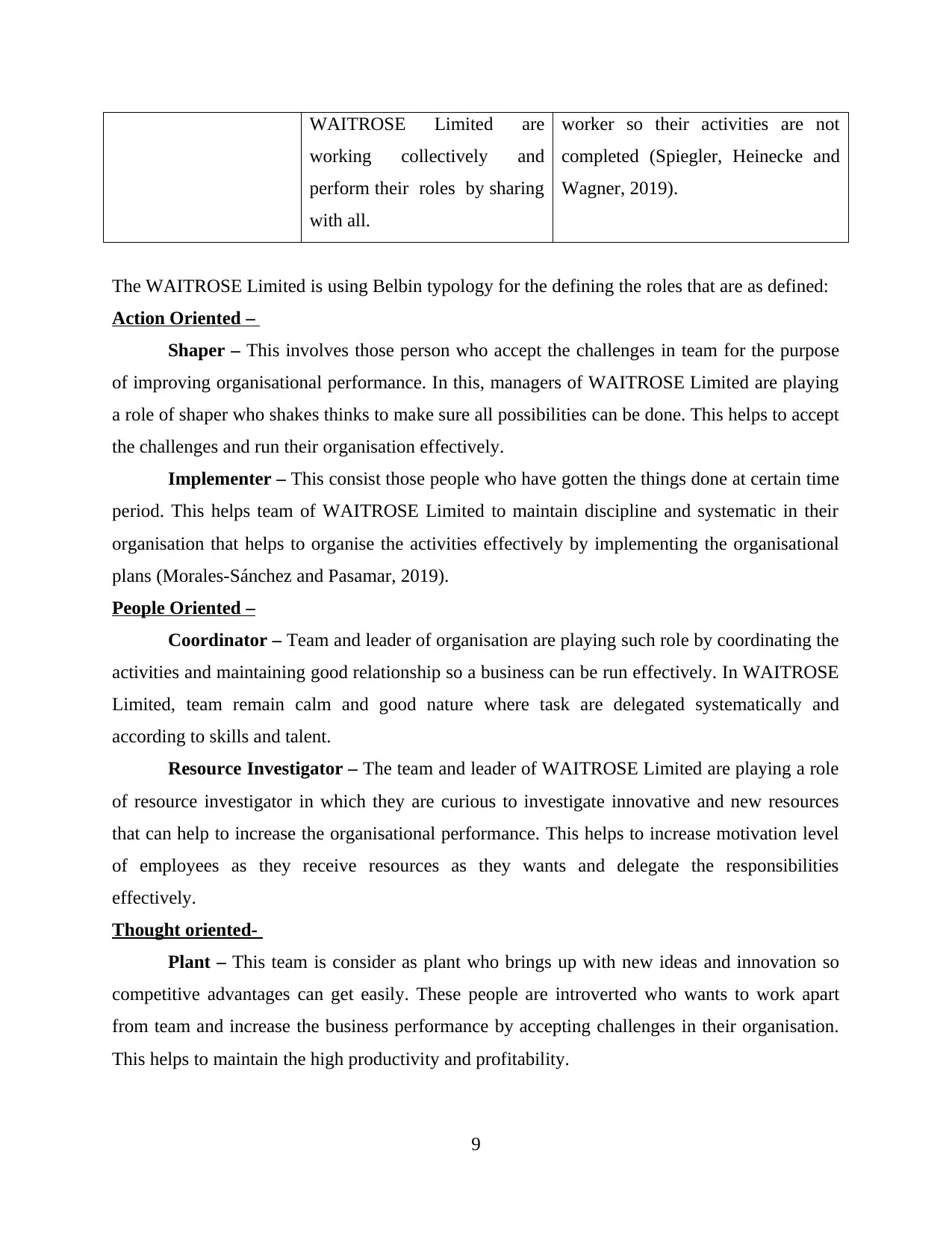
WAITROSE Limited are
working collectively and
perform their roles by sharing
with all.
worker so their activities are not
completed (Spiegler, Heinecke and
Wagner, 2019).
The WAITROSE Limited is using Belbin typology for the defining the roles that are as defined:
Action Oriented –
Shaper – This involves those person who accept the challenges in team for the purpose
of improving organisational performance. In this, managers of WAITROSE Limited are playing
a role of shaper who shakes thinks to make sure all possibilities can be done. This helps to accept
the challenges and run their organisation effectively.
Implementer – This consist those people who have gotten the things done at certain time
period. This helps team of WAITROSE Limited to maintain discipline and systematic in their
organisation that helps to organise the activities effectively by implementing the organisational
plans (Morales-Sánchez and Pasamar, 2019).
People Oriented –
Coordinator – Team and leader of organisation are playing such role by coordinating the
activities and maintaining good relationship so a business can be run effectively. In WAITROSE
Limited, team remain calm and good nature where task are delegated systematically and
according to skills and talent.
Resource Investigator – The team and leader of WAITROSE Limited are playing a role
of resource investigator in which they are curious to investigate innovative and new resources
that can help to increase the organisational performance. This helps to increase motivation level
of employees as they receive resources as they wants and delegate the responsibilities
effectively.
Thought oriented-
Plant – This team is consider as plant who brings up with new ideas and innovation so
competitive advantages can get easily. These people are introverted who wants to work apart
from team and increase the business performance by accepting challenges in their organisation.
This helps to maintain the high productivity and profitability.
9
working collectively and
perform their roles by sharing
with all.
worker so their activities are not
completed (Spiegler, Heinecke and
Wagner, 2019).
The WAITROSE Limited is using Belbin typology for the defining the roles that are as defined:
Action Oriented –
Shaper – This involves those person who accept the challenges in team for the purpose
of improving organisational performance. In this, managers of WAITROSE Limited are playing
a role of shaper who shakes thinks to make sure all possibilities can be done. This helps to accept
the challenges and run their organisation effectively.
Implementer – This consist those people who have gotten the things done at certain time
period. This helps team of WAITROSE Limited to maintain discipline and systematic in their
organisation that helps to organise the activities effectively by implementing the organisational
plans (Morales-Sánchez and Pasamar, 2019).
People Oriented –
Coordinator – Team and leader of organisation are playing such role by coordinating the
activities and maintaining good relationship so a business can be run effectively. In WAITROSE
Limited, team remain calm and good nature where task are delegated systematically and
according to skills and talent.
Resource Investigator – The team and leader of WAITROSE Limited are playing a role
of resource investigator in which they are curious to investigate innovative and new resources
that can help to increase the organisational performance. This helps to increase motivation level
of employees as they receive resources as they wants and delegate the responsibilities
effectively.
Thought oriented-
Plant – This team is consider as plant who brings up with new ideas and innovation so
competitive advantages can get easily. These people are introverted who wants to work apart
from team and increase the business performance by accepting challenges in their organisation.
This helps to maintain the high productivity and profitability.
9
Secure Best Marks with AI Grader
Need help grading? Try our AI Grader for instant feedback on your assignments.
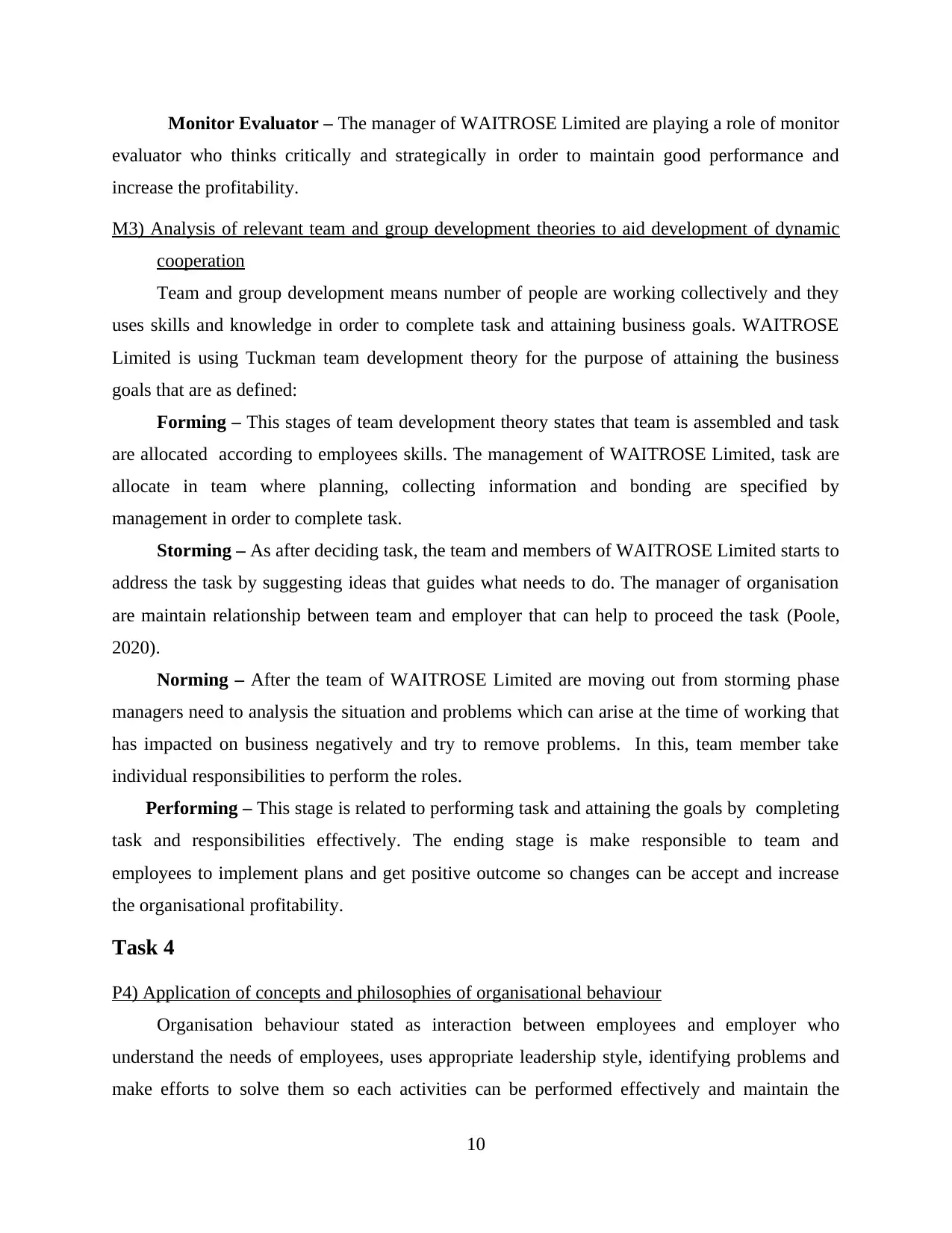
Monitor Evaluator – The manager of WAITROSE Limited are playing a role of monitor
evaluator who thinks critically and strategically in order to maintain good performance and
increase the profitability.
M3) Analysis of relevant team and group development theories to aid development of dynamic
cooperation
Team and group development means number of people are working collectively and they
uses skills and knowledge in order to complete task and attaining business goals. WAITROSE
Limited is using Tuckman team development theory for the purpose of attaining the business
goals that are as defined:
Forming – This stages of team development theory states that team is assembled and task
are allocated according to employees skills. The management of WAITROSE Limited, task are
allocate in team where planning, collecting information and bonding are specified by
management in order to complete task.
Storming – As after deciding task, the team and members of WAITROSE Limited starts to
address the task by suggesting ideas that guides what needs to do. The manager of organisation
are maintain relationship between team and employer that can help to proceed the task (Poole,
2020).
Norming – After the team of WAITROSE Limited are moving out from storming phase
managers need to analysis the situation and problems which can arise at the time of working that
has impacted on business negatively and try to remove problems. In this, team member take
individual responsibilities to perform the roles.
Performing – This stage is related to performing task and attaining the goals by completing
task and responsibilities effectively. The ending stage is make responsible to team and
employees to implement plans and get positive outcome so changes can be accept and increase
the organisational profitability.
Task 4
P4) Application of concepts and philosophies of organisational behaviour
Organisation behaviour stated as interaction between employees and employer who
understand the needs of employees, uses appropriate leadership style, identifying problems and
make efforts to solve them so each activities can be performed effectively and maintain the
10
evaluator who thinks critically and strategically in order to maintain good performance and
increase the profitability.
M3) Analysis of relevant team and group development theories to aid development of dynamic
cooperation
Team and group development means number of people are working collectively and they
uses skills and knowledge in order to complete task and attaining business goals. WAITROSE
Limited is using Tuckman team development theory for the purpose of attaining the business
goals that are as defined:
Forming – This stages of team development theory states that team is assembled and task
are allocated according to employees skills. The management of WAITROSE Limited, task are
allocate in team where planning, collecting information and bonding are specified by
management in order to complete task.
Storming – As after deciding task, the team and members of WAITROSE Limited starts to
address the task by suggesting ideas that guides what needs to do. The manager of organisation
are maintain relationship between team and employer that can help to proceed the task (Poole,
2020).
Norming – After the team of WAITROSE Limited are moving out from storming phase
managers need to analysis the situation and problems which can arise at the time of working that
has impacted on business negatively and try to remove problems. In this, team member take
individual responsibilities to perform the roles.
Performing – This stage is related to performing task and attaining the goals by completing
task and responsibilities effectively. The ending stage is make responsible to team and
employees to implement plans and get positive outcome so changes can be accept and increase
the organisational profitability.
Task 4
P4) Application of concepts and philosophies of organisational behaviour
Organisation behaviour stated as interaction between employees and employer who
understand the needs of employees, uses appropriate leadership style, identifying problems and
make efforts to solve them so each activities can be performed effectively and maintain the
10
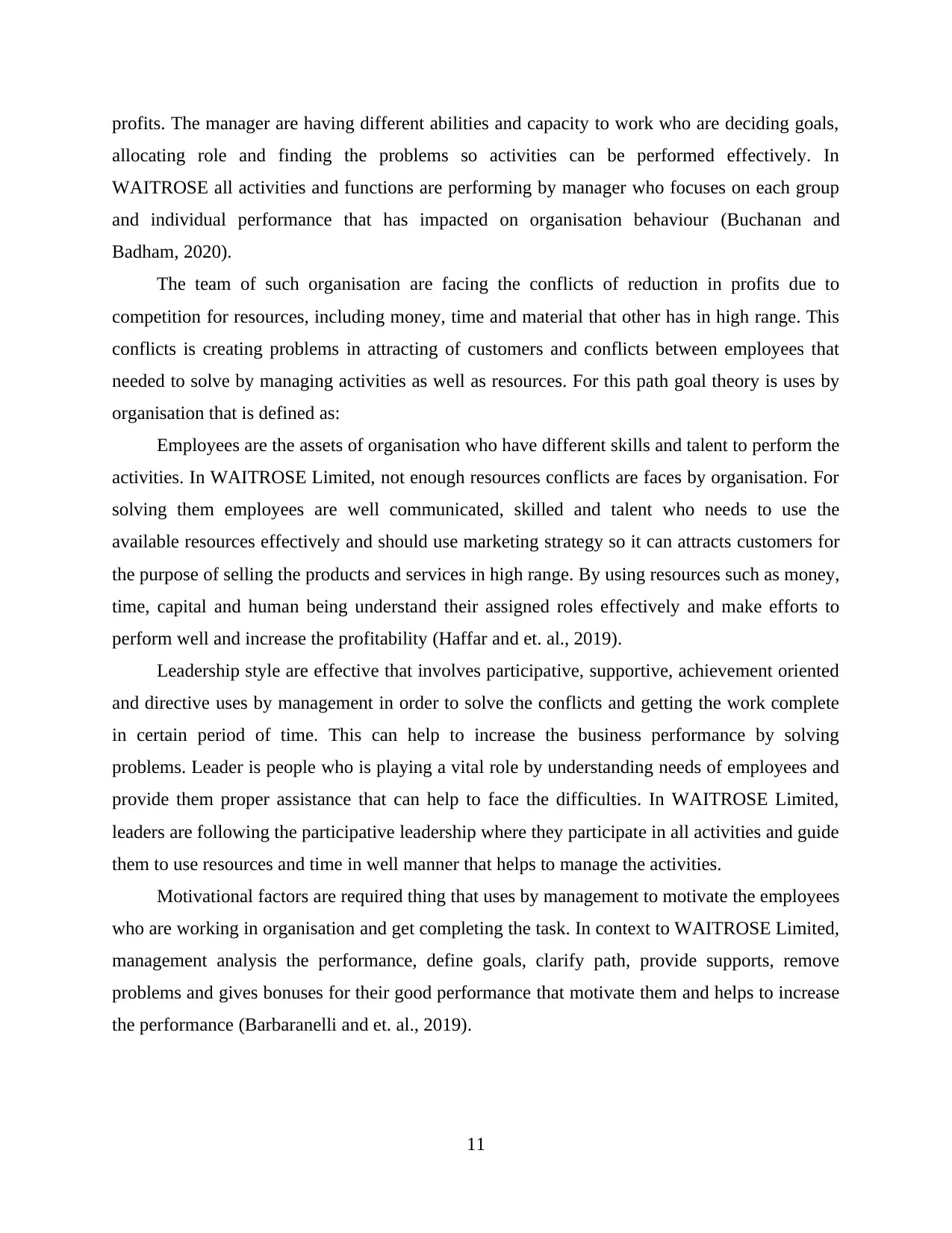
profits. The manager are having different abilities and capacity to work who are deciding goals,
allocating role and finding the problems so activities can be performed effectively. In
WAITROSE all activities and functions are performing by manager who focuses on each group
and individual performance that has impacted on organisation behaviour (Buchanan and
Badham, 2020).
The team of such organisation are facing the conflicts of reduction in profits due to
competition for resources, including money, time and material that other has in high range. This
conflicts is creating problems in attracting of customers and conflicts between employees that
needed to solve by managing activities as well as resources. For this path goal theory is uses by
organisation that is defined as:
Employees are the assets of organisation who have different skills and talent to perform the
activities. In WAITROSE Limited, not enough resources conflicts are faces by organisation. For
solving them employees are well communicated, skilled and talent who needs to use the
available resources effectively and should use marketing strategy so it can attracts customers for
the purpose of selling the products and services in high range. By using resources such as money,
time, capital and human being understand their assigned roles effectively and make efforts to
perform well and increase the profitability (Haffar and et. al., 2019).
Leadership style are effective that involves participative, supportive, achievement oriented
and directive uses by management in order to solve the conflicts and getting the work complete
in certain period of time. This can help to increase the business performance by solving
problems. Leader is people who is playing a vital role by understanding needs of employees and
provide them proper assistance that can help to face the difficulties. In WAITROSE Limited,
leaders are following the participative leadership where they participate in all activities and guide
them to use resources and time in well manner that helps to manage the activities.
Motivational factors are required thing that uses by management to motivate the employees
who are working in organisation and get completing the task. In context to WAITROSE Limited,
management analysis the performance, define goals, clarify path, provide supports, remove
problems and gives bonuses for their good performance that motivate them and helps to increase
the performance (Barbaranelli and et. al., 2019).
11
allocating role and finding the problems so activities can be performed effectively. In
WAITROSE all activities and functions are performing by manager who focuses on each group
and individual performance that has impacted on organisation behaviour (Buchanan and
Badham, 2020).
The team of such organisation are facing the conflicts of reduction in profits due to
competition for resources, including money, time and material that other has in high range. This
conflicts is creating problems in attracting of customers and conflicts between employees that
needed to solve by managing activities as well as resources. For this path goal theory is uses by
organisation that is defined as:
Employees are the assets of organisation who have different skills and talent to perform the
activities. In WAITROSE Limited, not enough resources conflicts are faces by organisation. For
solving them employees are well communicated, skilled and talent who needs to use the
available resources effectively and should use marketing strategy so it can attracts customers for
the purpose of selling the products and services in high range. By using resources such as money,
time, capital and human being understand their assigned roles effectively and make efforts to
perform well and increase the profitability (Haffar and et. al., 2019).
Leadership style are effective that involves participative, supportive, achievement oriented
and directive uses by management in order to solve the conflicts and getting the work complete
in certain period of time. This can help to increase the business performance by solving
problems. Leader is people who is playing a vital role by understanding needs of employees and
provide them proper assistance that can help to face the difficulties. In WAITROSE Limited,
leaders are following the participative leadership where they participate in all activities and guide
them to use resources and time in well manner that helps to manage the activities.
Motivational factors are required thing that uses by management to motivate the employees
who are working in organisation and get completing the task. In context to WAITROSE Limited,
management analysis the performance, define goals, clarify path, provide supports, remove
problems and gives bonuses for their good performance that motivate them and helps to increase
the performance (Barbaranelli and et. al., 2019).
11
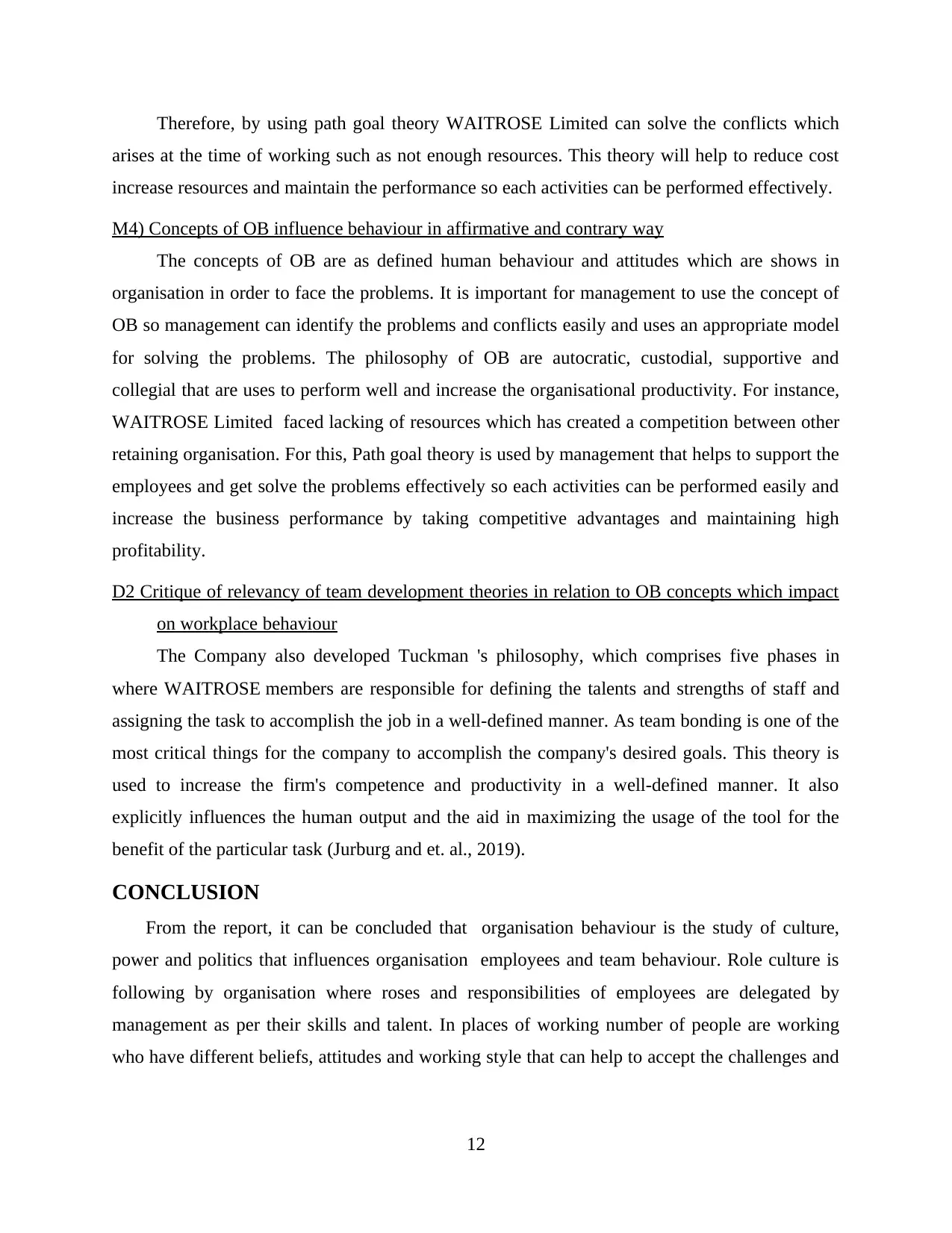
Therefore, by using path goal theory WAITROSE Limited can solve the conflicts which
arises at the time of working such as not enough resources. This theory will help to reduce cost
increase resources and maintain the performance so each activities can be performed effectively.
M4) Concepts of OB influence behaviour in affirmative and contrary way
The concepts of OB are as defined human behaviour and attitudes which are shows in
organisation in order to face the problems. It is important for management to use the concept of
OB so management can identify the problems and conflicts easily and uses an appropriate model
for solving the problems. The philosophy of OB are autocratic, custodial, supportive and
collegial that are uses to perform well and increase the organisational productivity. For instance,
WAITROSE Limited faced lacking of resources which has created a competition between other
retaining organisation. For this, Path goal theory is used by management that helps to support the
employees and get solve the problems effectively so each activities can be performed easily and
increase the business performance by taking competitive advantages and maintaining high
profitability.
D2 Critique of relevancy of team development theories in relation to OB concepts which impact
on workplace behaviour
The Company also developed Tuckman 's philosophy, which comprises five phases in
where WAITROSE members are responsible for defining the talents and strengths of staff and
assigning the task to accomplish the job in a well-defined manner. As team bonding is one of the
most critical things for the company to accomplish the company's desired goals. This theory is
used to increase the firm's competence and productivity in a well-defined manner. It also
explicitly influences the human output and the aid in maximizing the usage of the tool for the
benefit of the particular task (Jurburg and et. al., 2019).
CONCLUSION
From the report, it can be concluded that organisation behaviour is the study of culture,
power and politics that influences organisation employees and team behaviour. Role culture is
following by organisation where roses and responsibilities of employees are delegated by
management as per their skills and talent. In places of working number of people are working
who have different beliefs, attitudes and working style that can help to accept the challenges and
12
arises at the time of working such as not enough resources. This theory will help to reduce cost
increase resources and maintain the performance so each activities can be performed effectively.
M4) Concepts of OB influence behaviour in affirmative and contrary way
The concepts of OB are as defined human behaviour and attitudes which are shows in
organisation in order to face the problems. It is important for management to use the concept of
OB so management can identify the problems and conflicts easily and uses an appropriate model
for solving the problems. The philosophy of OB are autocratic, custodial, supportive and
collegial that are uses to perform well and increase the organisational productivity. For instance,
WAITROSE Limited faced lacking of resources which has created a competition between other
retaining organisation. For this, Path goal theory is used by management that helps to support the
employees and get solve the problems effectively so each activities can be performed easily and
increase the business performance by taking competitive advantages and maintaining high
profitability.
D2 Critique of relevancy of team development theories in relation to OB concepts which impact
on workplace behaviour
The Company also developed Tuckman 's philosophy, which comprises five phases in
where WAITROSE members are responsible for defining the talents and strengths of staff and
assigning the task to accomplish the job in a well-defined manner. As team bonding is one of the
most critical things for the company to accomplish the company's desired goals. This theory is
used to increase the firm's competence and productivity in a well-defined manner. It also
explicitly influences the human output and the aid in maximizing the usage of the tool for the
benefit of the particular task (Jurburg and et. al., 2019).
CONCLUSION
From the report, it can be concluded that organisation behaviour is the study of culture,
power and politics that influences organisation employees and team behaviour. Role culture is
following by organisation where roses and responsibilities of employees are delegated by
management as per their skills and talent. In places of working number of people are working
who have different beliefs, attitudes and working style that can help to accept the challenges and
12
Paraphrase This Document
Need a fresh take? Get an instant paraphrase of this document with our AI Paraphraser
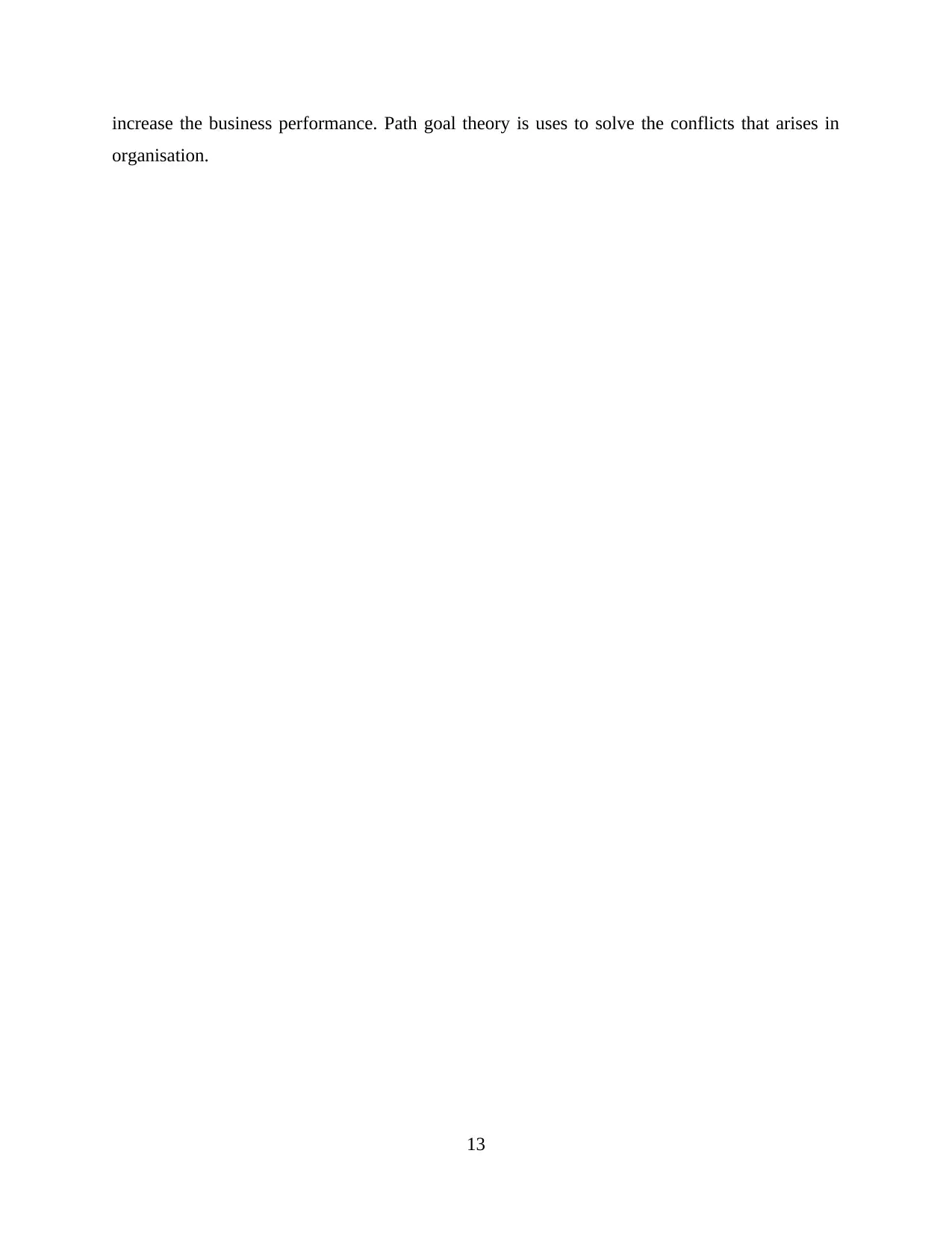
increase the business performance. Path goal theory is uses to solve the conflicts that arises in
organisation.
13
organisation.
13
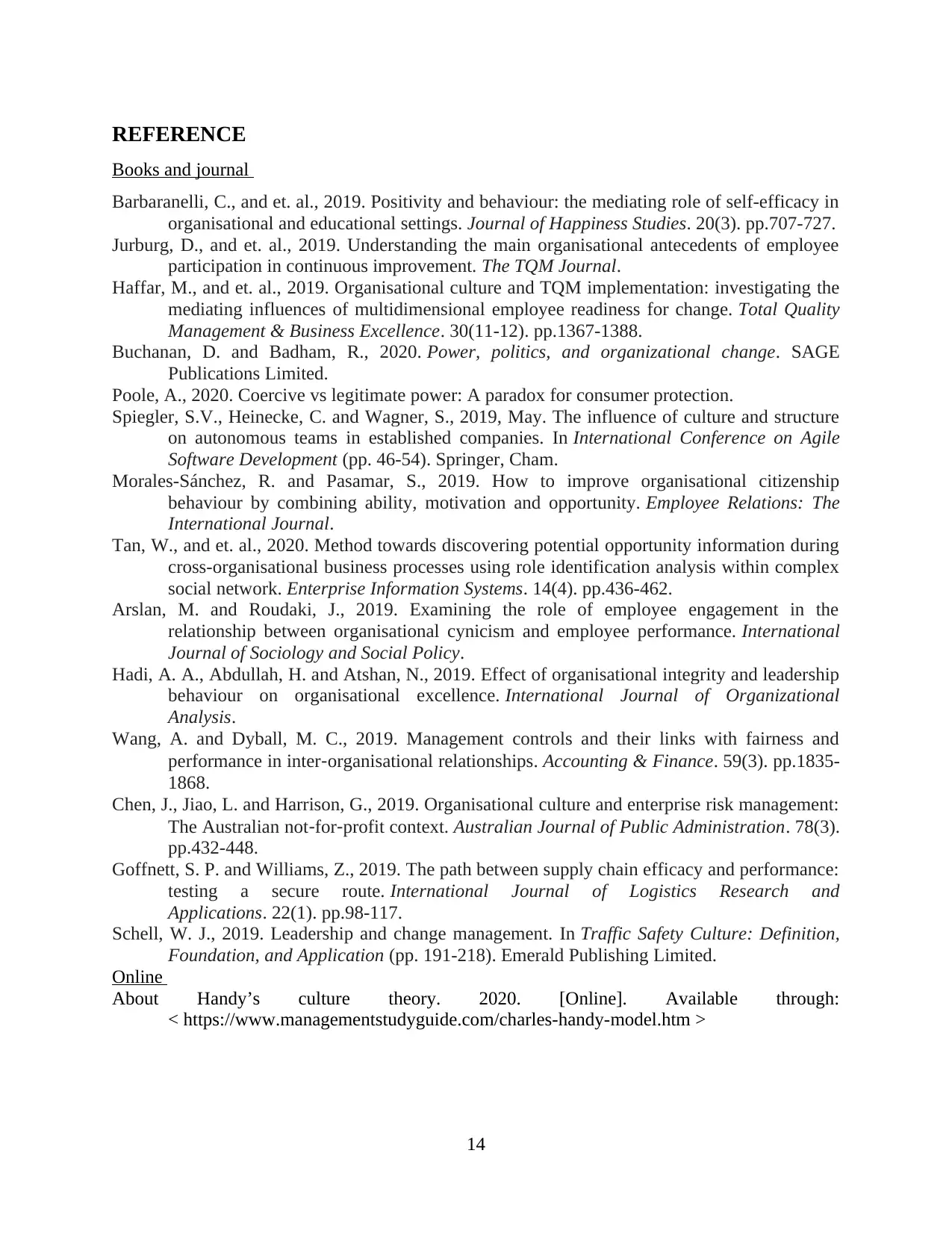
REFERENCE
Books and journal
Barbaranelli, C., and et. al., 2019. Positivity and behaviour: the mediating role of self-efficacy in
organisational and educational settings. Journal of Happiness Studies. 20(3). pp.707-727.
Jurburg, D., and et. al., 2019. Understanding the main organisational antecedents of employee
participation in continuous improvement. The TQM Journal.
Haffar, M., and et. al., 2019. Organisational culture and TQM implementation: investigating the
mediating influences of multidimensional employee readiness for change. Total Quality
Management & Business Excellence. 30(11-12). pp.1367-1388.
Buchanan, D. and Badham, R., 2020. Power, politics, and organizational change. SAGE
Publications Limited.
Poole, A., 2020. Coercive vs legitimate power: A paradox for consumer protection.
Spiegler, S.V., Heinecke, C. and Wagner, S., 2019, May. The influence of culture and structure
on autonomous teams in established companies. In International Conference on Agile
Software Development (pp. 46-54). Springer, Cham.
Morales-Sánchez, R. and Pasamar, S., 2019. How to improve organisational citizenship
behaviour by combining ability, motivation and opportunity. Employee Relations: The
International Journal.
Tan, W., and et. al., 2020. Method towards discovering potential opportunity information during
cross-organisational business processes using role identification analysis within complex
social network. Enterprise Information Systems. 14(4). pp.436-462.
Arslan, M. and Roudaki, J., 2019. Examining the role of employee engagement in the
relationship between organisational cynicism and employee performance. International
Journal of Sociology and Social Policy.
Hadi, A. A., Abdullah, H. and Atshan, N., 2019. Effect of organisational integrity and leadership
behaviour on organisational excellence. International Journal of Organizational
Analysis.
Wang, A. and Dyball, M. C., 2019. Management controls and their links with fairness and
performance in inter‐organisational relationships. Accounting & Finance. 59(3). pp.1835-
1868.
Chen, J., Jiao, L. and Harrison, G., 2019. Organisational culture and enterprise risk management:
The Australian not‐for‐profit context. Australian Journal of Public Administration. 78(3).
pp.432-448.
Goffnett, S. P. and Williams, Z., 2019. The path between supply chain efficacy and performance:
testing a secure route. International Journal of Logistics Research and
Applications. 22(1). pp.98-117.
Schell, W. J., 2019. Leadership and change management. In Traffic Safety Culture: Definition,
Foundation, and Application (pp. 191-218). Emerald Publishing Limited.
Online
About Handy’s culture theory. 2020. [Online]. Available through:
< https://www.managementstudyguide.com/charles-handy-model.htm >
14
Books and journal
Barbaranelli, C., and et. al., 2019. Positivity and behaviour: the mediating role of self-efficacy in
organisational and educational settings. Journal of Happiness Studies. 20(3). pp.707-727.
Jurburg, D., and et. al., 2019. Understanding the main organisational antecedents of employee
participation in continuous improvement. The TQM Journal.
Haffar, M., and et. al., 2019. Organisational culture and TQM implementation: investigating the
mediating influences of multidimensional employee readiness for change. Total Quality
Management & Business Excellence. 30(11-12). pp.1367-1388.
Buchanan, D. and Badham, R., 2020. Power, politics, and organizational change. SAGE
Publications Limited.
Poole, A., 2020. Coercive vs legitimate power: A paradox for consumer protection.
Spiegler, S.V., Heinecke, C. and Wagner, S., 2019, May. The influence of culture and structure
on autonomous teams in established companies. In International Conference on Agile
Software Development (pp. 46-54). Springer, Cham.
Morales-Sánchez, R. and Pasamar, S., 2019. How to improve organisational citizenship
behaviour by combining ability, motivation and opportunity. Employee Relations: The
International Journal.
Tan, W., and et. al., 2020. Method towards discovering potential opportunity information during
cross-organisational business processes using role identification analysis within complex
social network. Enterprise Information Systems. 14(4). pp.436-462.
Arslan, M. and Roudaki, J., 2019. Examining the role of employee engagement in the
relationship between organisational cynicism and employee performance. International
Journal of Sociology and Social Policy.
Hadi, A. A., Abdullah, H. and Atshan, N., 2019. Effect of organisational integrity and leadership
behaviour on organisational excellence. International Journal of Organizational
Analysis.
Wang, A. and Dyball, M. C., 2019. Management controls and their links with fairness and
performance in inter‐organisational relationships. Accounting & Finance. 59(3). pp.1835-
1868.
Chen, J., Jiao, L. and Harrison, G., 2019. Organisational culture and enterprise risk management:
The Australian not‐for‐profit context. Australian Journal of Public Administration. 78(3).
pp.432-448.
Goffnett, S. P. and Williams, Z., 2019. The path between supply chain efficacy and performance:
testing a secure route. International Journal of Logistics Research and
Applications. 22(1). pp.98-117.
Schell, W. J., 2019. Leadership and change management. In Traffic Safety Culture: Definition,
Foundation, and Application (pp. 191-218). Emerald Publishing Limited.
Online
About Handy’s culture theory. 2020. [Online]. Available through:
< https://www.managementstudyguide.com/charles-handy-model.htm >
14

15
1 out of 16
Related Documents
Your All-in-One AI-Powered Toolkit for Academic Success.
+13062052269
info@desklib.com
Available 24*7 on WhatsApp / Email
![[object Object]](/_next/static/media/star-bottom.7253800d.svg)
Unlock your academic potential
© 2024 | Zucol Services PVT LTD | All rights reserved.




